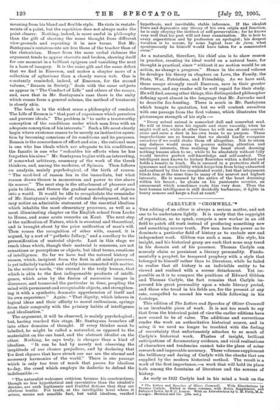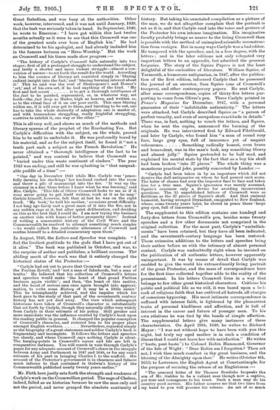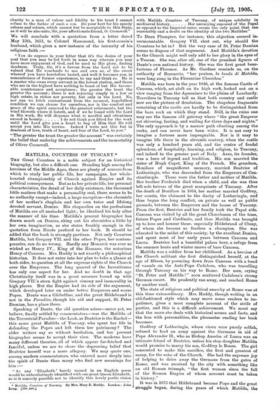THE editing of an editor is always a serious matter,
and not one to be undertaken lightly. It is rarely that the copyright of reputation, so to speak, compels a new worker in an old field to patch old work instead of producing something new and something nearer truth. Few men have the power so to dominate a particular field of history as to exclude new and independent work. Gibbon was such a man. His style, his insight, and his historical grasp are such that none may tread in his domain out of his presence. Thomas Carlyle can scarcely claim so persistent a literary personality. Funda- mentally a prophet, he tempered prophecy with a style that belonged to himself rather than to literature, while he failed to realise that all history is an indivisible entity to be viewed and realised with a serene detachment. 'Yet im- possible as it is to compare the positions of Edward Gibbon and Thomas Carlyle, the fact remains that Carlyle im- pressed his great personality upon a whole literary period, and those who tread in his fields are, for the present at any rate, compelled to amend his work while following in his footsteps.
This edition of The Letters and Speeches of Oliver Cromwell is an invaluable piece of work. It is not too much to say that from the historical point of view the earlier editions have now ceased to be of value. The additions and corrections render the work an authoritative historical source, and in using it we need no longer be troubled with the feeling of uncertainty that unfortunately attaches to so much of Carlyle's historical work. Flashes of insight, brilliant anticipations of documentary evidence, and vivid realisations of characters and tendencies cannot take the place of sober research and impeccable accuracy. These volumes supplement the brilliancy and daring of Carlyle with the checks that are supplied by the modern historical method. The result is a work of the first importance,—a work that will hold its place both among the fountains of literature and the sources of history.
As early as 1822 Carlyle had in his mind a book on the
* The Letters and Speeches of Oliver Cromwell. With Elucidations by Thomas Carlyle. Edited in three volumes, with Notes, Supplement, and Enlarged Index, by S. C. Lomas. With an Introduction by C. H. Firth, MA. Loncipu Methuen and CO. [18s. net.1
Great Rebellion, and was busy at the authorities. Other work, however, intervened, and it was not until January, 1839, that the task was seriously taken in hand. In September, 1840, he wrote to Emerson : " I have got within this last twelve months actually as it were to see that this Cromwell was one of the greatest souls ever born of English kin." He bad determined to be his apologist, and had already included him in the famous lectures on " Hero-Worship." But the work on Cromwell and his times made slow progress :—
"The history of Carlyle's Cromwell falls naturally into two stages; first of all a prolonged struggle to understand the subject, and lastly a shorter and more violent struggle—almost a con- vulsion of nature—to set forth the result for the world. According to him the essence of literary art consisted simply in `blazing radiant insight into the fact,' and blazing burning interest about it.' This he said was the soul of Shakespeare's and Homer's `art,' and of his own art, if he had anything of the kind. My first and last secret is to get a thorough intelligence of the fact to be painted, represented, or, in whatever way, set forth—the fact deep as Hades, high as heaven, and written so, as to the visual face of it on our poor earth. This once blazing within me, if it will ever get to blaze, and bursting to be out, one has to take the whole dexterity of adaptation one is master of, and with tremendous struggling, really frightful struggling, contrive to exhibit it, one way or the other.' "
This is all very well, and shows us much of the methods and literary spasms of the prophet of the Everlasting Yea. But Carlyle's difficulties with the subject, on the whole, proved him to be unfit to undertake it. He was profoundly bored by his material, and as for the subject itself, he found it "not a tenth part such a subject as the French Revolution." He never obtained a " thorough intelligence of the fact to be painted," and was content to believe that Cromwell was "buried under this waste continent of cinders." The year 1843 was ending, and still lie was splashing in " that unspeak- able puddle of a time" :—
" One day in December 1843 while Mrs. Carlyle was ' peace- fully darning his stockings' her husband rushed into the room and threw a pile of manuscript into the fire. It was up the chimney in a line blaze before 1 knew what he was burning,' said Mrs. Carlyle. This life of Oliver Cromwell looks to me as if it were never going to get itself written, work at it as he may.' Carlyle himself, however, felt that at last he was on the right track. ' My book,' he told his mother, occasions great difficulty. I not long ago fairly cast a great mass of it into the fire, not in any sudden rage at it, but after quiet deliberation, and deciding on this as the best that I could do. I am now trying the business on another side with hopes of better prosperity there.' Instead of writing a consecutive history of the Civil Wars and the Commonwealth he resolved to attempt something much simpler —he would collect the authentic utterances of Cromwell and confine himself to a detailed commentary upon them."
In August, 181,5, the Letters and Speeches was complete. " I feel the liveliest gratitude to the gods that I have got out of it alive." The book was published in October, and was, to the surprise of author and publisher, a brilliant success. The abiding merit of the work was that it entirely changed the historical status of the Protector :—
"Carlyle had set out to prove that Cromwell was 'the soul of the Puritan Revolt,' and not a man of falsehoods, but a man of truths.' He believed that his collection of Cromwell's letters and speeches would make the heart of that grand Puritan business again visible' ; and then, 'the heart of this matter, and the heart of serious men once again brought into approxi- mation, to write some History of it may be a little easier.' This he triumphantly achieved, and the impulse which his book gave to the study of that part of the seventeenth century history has not yet died away. The view which subsequent historians have taken of Cromwell's character is substantially that set forth by Carlyle, though they naturally differ very widely from Carlyle in their estimate of his policy. Still greater and more immediate was the influence exerted by Carlyle's book upon the reading public in general. It changed the popular conception of Cromwell's character, and restored him to his proper place amongst English worthies Nevertheless, regarded simply as the biography of a great statesman and soldier Carlyle's book is fragmentary and incomplete. It follows the letters and speeches too closely, and where Cromwell says nothing Carlyle is silent. The turning-points in Cromwell's career and life are left in comparative darkness. You will search in vain through Carlyle's pages for any adequate account of Cromwell's share in the struggle between Army and Parliament in 1647 and 1648, or for any exact estimate of his part in bringing Charles I. to the scaffold. His account of the Protector's government is in clearness and fulness much inferior to that contained in Godwin's history of the Commonwealth published nearly twenty years earlier."
Mr. Firth here justly sets forth the strength and weakness of Carlyle's work on the Cromwellian period. The sage of Chelsea, indeed, failed as an historian because he saw the man only and not the period, and never grasped the absolute continuity of history. But taking his annotated compilation as a picture of the man, we do not altogether complain that the portrait is set as it is, and that Carlyle read into the voice and gesture of the Protector his own intense imagination. His imaginative faculty probably brings us nearer to the living Cromwell than is possible with the method of uninspired scientific reconstruc- tion from vestiges. But in many ways Carlyle was a bad editor.
He tampered with the speeches, and, in a less degree, with the letters ; and in the later editions not only relegated very important letters to an appendix, but admitted the grossest forgeries. The story of the Squire Papers is not the least delightful of the curiosities of literature. William Squire, of Yarmouth, a humorous antiquarian, in 1847, after the publica- tion of the first edition, informed Carlyle that he possessed the journal of an ancestor, Sam Squire (one of Cromwell's troopers), and other contemporary papers. He sent Carlyle, after some correspondence, copies of thirty-five letters pur- porting to come from Oliver's pen. These Carlyle printed in Frazer's Magazine for December, 1847, with a personal guarantee of their " indubitable authenticity." The letters were attacked, but Carlyle described Squire as " a person of perfect veracity, and even of scrupulous exactitude in details."
There was, in fact, nothing to vouch the letters, and Squire, when he sent the copies, announced the burning of the originals. He was interviewed first by Edward FitzGerald,, and later by Carlyle, who found him " a man of round rosy face, large grey eyes, full of innocence yet of unquiet vehemence Something radically honest, even brave and benevolent, was in the man's look, nay something blowsy and almost jolly." Squire pretended to be half mad, and explained his mental state by the fact that as a boy his skull had been broken " into 37 pieces." The whole thing was a monstrous practical joke, possibly concocted by Lander :-
"Carlyle had been taken in by an imposture which did not deceive the dull antiquaries on whom he had poured such scorn. The hater of shams had seen the impostor face to face and taken him for a true man. Squire's ignorance was merely assumed. Squire's craziness only a device for avoiding inconvenient questions. The 35 unpublished letters of Cromwell were as fictitious as the 37 pieces of Squire's skull. And that eminent humorist, having avenged Dryasdust, emigrated to New Zealand, where, some twenty years later, he closed in peace those large grey eyes, full of innocence.'"
The supplement to this edition contains one hundrwl and forty-five letters from Cromwell's pen, besides some twenty speeches and a few other documents not comprised in the original collection. For the most part,' Carlyle's "embellish- .
ments " have been retained, but they have all been indicated, and the seventeenth-century language has been restored. These extensive additions to the letters and speeches bring their author before us with the intimacy of almost personal contact. Carlyle was undoubtedly right when he insisted on the publication of all authentic letters, however apparently unimportant. It was by means of detail that Carlyle was enabled to give the world his extraordinarily living portrait of the great Protector, and the mass of correspondence here for the first time collected together adds to the reality of the presentment. In his letters Cromwell lives in a way that belongs to few other great historical characters. Criticise his public and political life as we will, it was based upon a bed- rock of religious faith that has outlived all hatreds, all charges of conscious hypocrisy. His most intimate correspondence is suffused with intense faith, is lightened by the pleasantest traits of personal kindliness and affection, and is full of interest in the career and future of younger men. To his own relations he was tied by the bonds of simple affection.
The supplemental letters give many instances of these characteristics. On April 28th, 1649, he writes to Richard Mayor : "I was not without hope to have been with you this night, but truly my aged mother is in such a condition of illness that I could not leave her with satisfaction." He writes (" haste, post haste") to Colonel Robin Hammond, Governor of the Isle of Wight : " Dear Robin am I forgotten ? Thou art not, I wish thee much comfort in thy great business, and the blessing of the Almighty upon thee." He writes (October 4th, 1653) to Lawrence, the English Agent at Constantinople, for the purpose of securing the release of an Englishman :—
"The annexed letter of Sir Thomas Bendishe bespeaks the son of Mr. Galilee to be a valiant man though now a captive, yet true and courageous to his trust. Such a man may do his country good service. . His father assures me that two lines from my hand to you will procure his release. An act of so much
charity to a man of valour and fidelity to his trust I cannot refuse to the father of such a son. Do your best for his speedy release and return, which cannot but be acceptable to this State, as it will be also unto, Sir, your affectionate friend, 0. Cromwell?'
We will conclude with a quotation from a letter dated May 13th, 1651, to Colonel Hammond, his first-cousin's husband, which gives a new instance of the intensity of his religious faith :- " You do express in your letter that it's the desire of your soul that you may be led forth in some way wherein you may have more enjoyment of God, and be used to His glory, finding deadness. Truly, Sir, it's a favour from the Lord not to be valued that He vouchsafe to use and own us, of the sweet whereof you have heretofore tasted, and well it becomes you, in remembrance of former experiences, to say and think so. He is a master who owns every servant in the lowest station, and those who are in the highest have nothing to boast of but His favour- able countenance and acceptance; the greater the trust the greater the account; there is not rejoicing simply in a low or high estate, in riches nor poverty, but only in the Lord. No, nor tan we fetch contentment from the securest, hopefullest condition we can choose for ourselves, nor is the comfort and peace of the spirit annexed to the greatest retirements, but the wind bloweth where it listeth, and if we be found with the Lord in His work, He will dispense what is needful and oftentimes
exceed in bounty I do not think you fitted for the work until the Lord give you a heart to beg of Him that He will accept you into His service. Indeed I write not this but in dearness of love, truth of heart, and fear of the Lord, to you."
" The greater the trust the greater the account " was certainly the belief that underlay the achievements and the immortality of Oliver Cromwell.
4ATILDA, COUNTESS OF TUSCANY.*




































 Previous page
Previous page